iHeartDogs is reader supported. Some of the links below may be paid affiliate links, where we receive a small commission on a product at no additional cost to you.
In the quest to provide optimal nutrition for our four-legged companions, dog owners are turning to a variety of diet trends, and one that’s garnering significant attention is the ketogenic diet. Known for its low-carb, high-fat composition, the ketogenic diet for dogs is believed to offer a host of health benefits, including weight management, increased energy levels, and even a potential preventative measure against certain types of cancer. In this article, we explore some of the best keto dog foods available on the market to help you make an informed choice for your furry friend’s well-being.
#1 – Ketona Chicken Recipe Adult Dry Dog Food, Natural, Low Carb (only 5%), High Protein (46%), Grain-Free, The Nutrition of a Raw Diet with The Cost and Convenience of a Kibble; 4.2lb
Ketona Chicken Recipe Adult Dry Dog Food is a grain-free dog food that offers a low-carb and high-protein alternative to traditional kibble. With only 5% carbohydrates and over 46% protein, this food provides the nutrition of a raw diet without the inconvenience or expense. The chicken used is non-GMO, antibiotic-free, and sourced from American ranchers who follow sustainable practices. Created by Daniel Schulof, the author of “Dogs, Dog Food, and Dogma,” this product is made in the USA using natural ingredients.
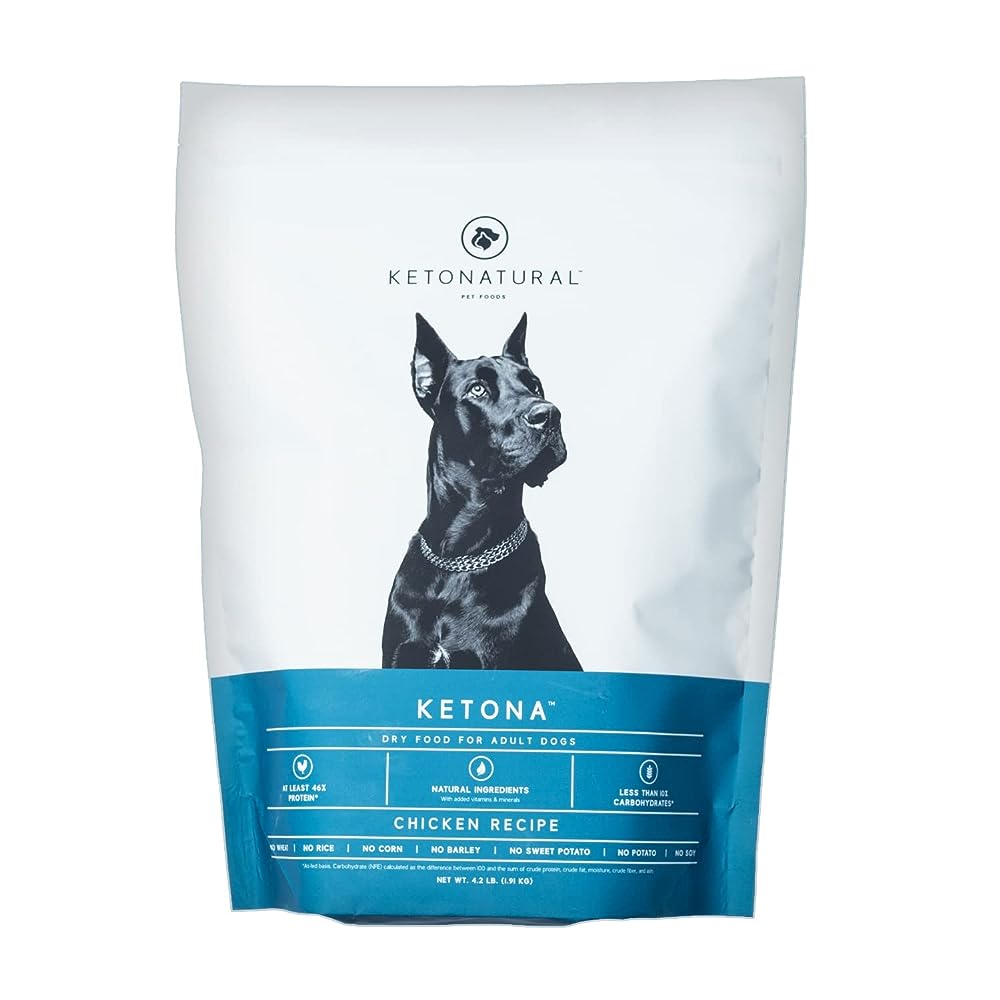

#2 – Visionary Pet Foods – High Protein Natural Beef Flavored Kibble | Low Carb Dry Dog Food | Grain Free with Limited Ingredients for Small, Medium and Large Breeds | Real Meat Beef Recipe 22lb
Visionary Pet Foods offers a high protein, natural beef-flavored kibble for dogs of all sizes. This low-carb, grain-free dog food is made with limited ingredients, making it ideal for dogs with sensitive skin and allergies. The recipe, powered by protein and fat instead of carbs, provides dogs with more energy, improved weight management, and various health benefits reported by satisfied pet parents.
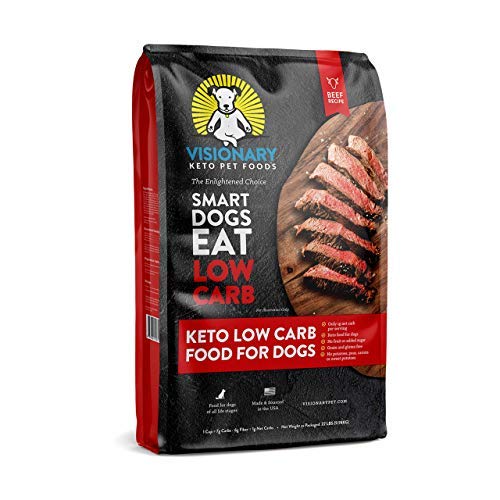
#3 – Visionary Pet Foods – Natural Chicken Flavored Kibble | Low Carb Dry Dog Food | High Protein | Grain Free| Limited Ingredients | Real Meat Chicken Recipe 22lb Large Bag
Visionary Pet Foods offers a natural, low-carb, and grain-free dry dog food that is high in protein. Made with real meat chicken, this formula provides dogs with the energy they need, helps with weight management, and improves their overall well-being. With no fillers or digestible carbohydrates, this dog food is perfect for dogs with sensitive skin and helps to improve their coat. Visionary Pet Foods aims to provide optimal nutrition for dogs of all ages through their high-quality products.
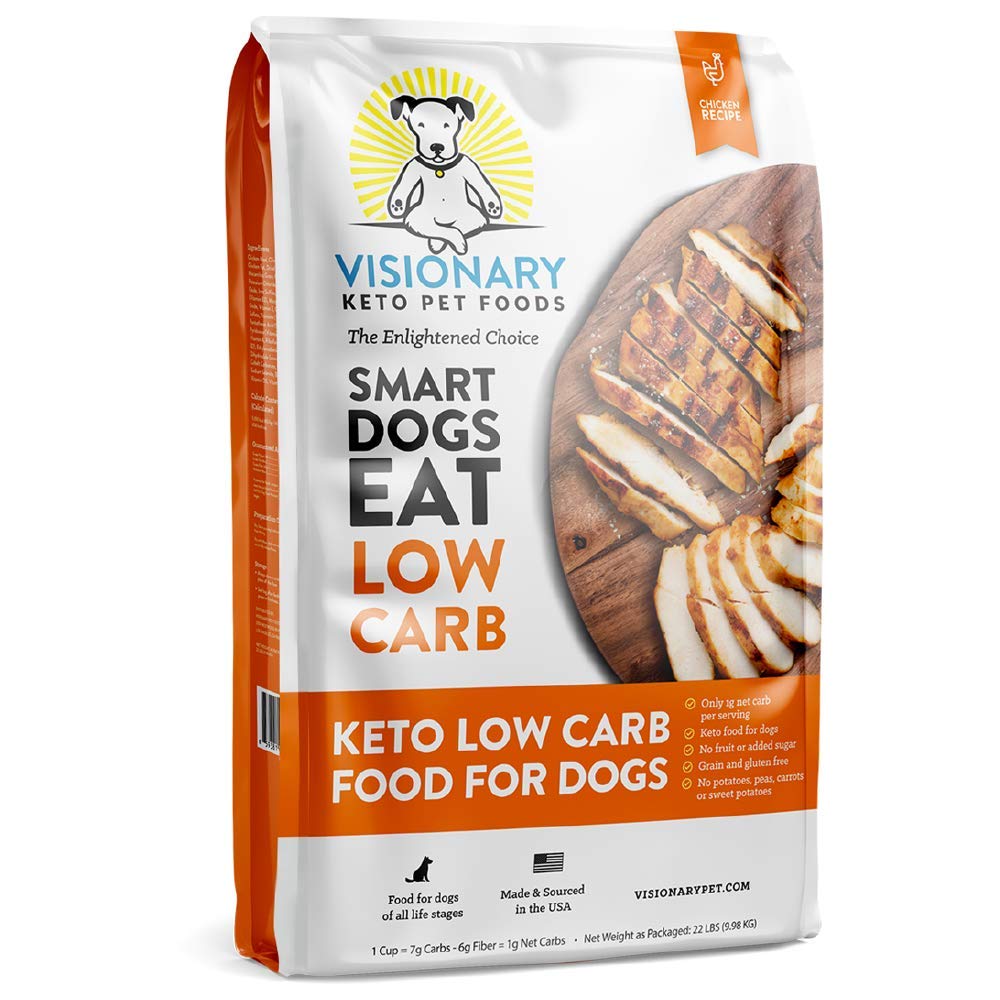
#4 – Ketogenic Pet Foods – Keto-Kibble – High Protein, Low Carb, Starch Free, Grain Free Dog & Cat Food – 8 lb
Ketogenic Pet Foods offers Keto-Kibble, a high protein, low carb, starch-free, and grain-free dog and cat food. This product aims to provide a protein and fat-based meal that is designed to support proper metabolic balance in carnivorous pets. The kibble is free of inflammatory starch fillers and can be used as a complete meal or as a supplement to your pet’s current food. It is manufactured in the USA and formulated to exceed the minimum nutritional standards established for maintenance by the AAFCO.
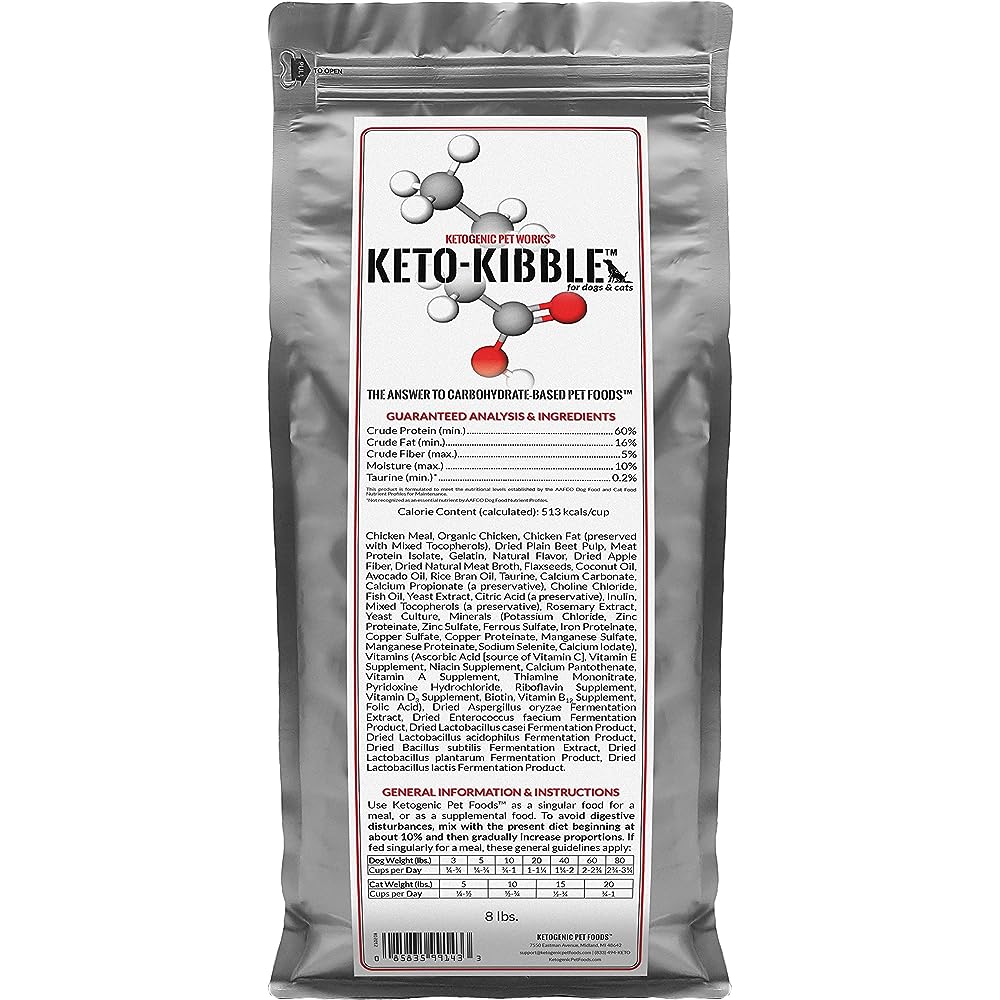
#5 – Ketona Salmon Recipe Adult Dry Dog Food, Natural, Low Carb (Only 5%), High Protein (46%), Grain-Free, The Nutrition of a Raw Diet with The Cost and Convenience of a Kibble; 4.2 lb
Ketona Salmon Recipe Adult Dry Dog Food is a natural and grain-free option for dog owners looking for a high protein, low carbohydrate diet for their pets. With only 5% carbs and 46% protein, it closely mimics a dog’s natural diet, providing the nutrition of a raw diet with the convenience of kibble. This product helps dogs maintain a lean physique by burning body fat and promoting strong lean muscles, while also reducing blood sugar levels and alleviating itching and inflammation. Additionally, Ketona offers ultra-premium nutrition at a lower cost compared to other raw and fresh diets. Transitioning to Ketona is also easy and quick, as there is no need for a gradual transition.
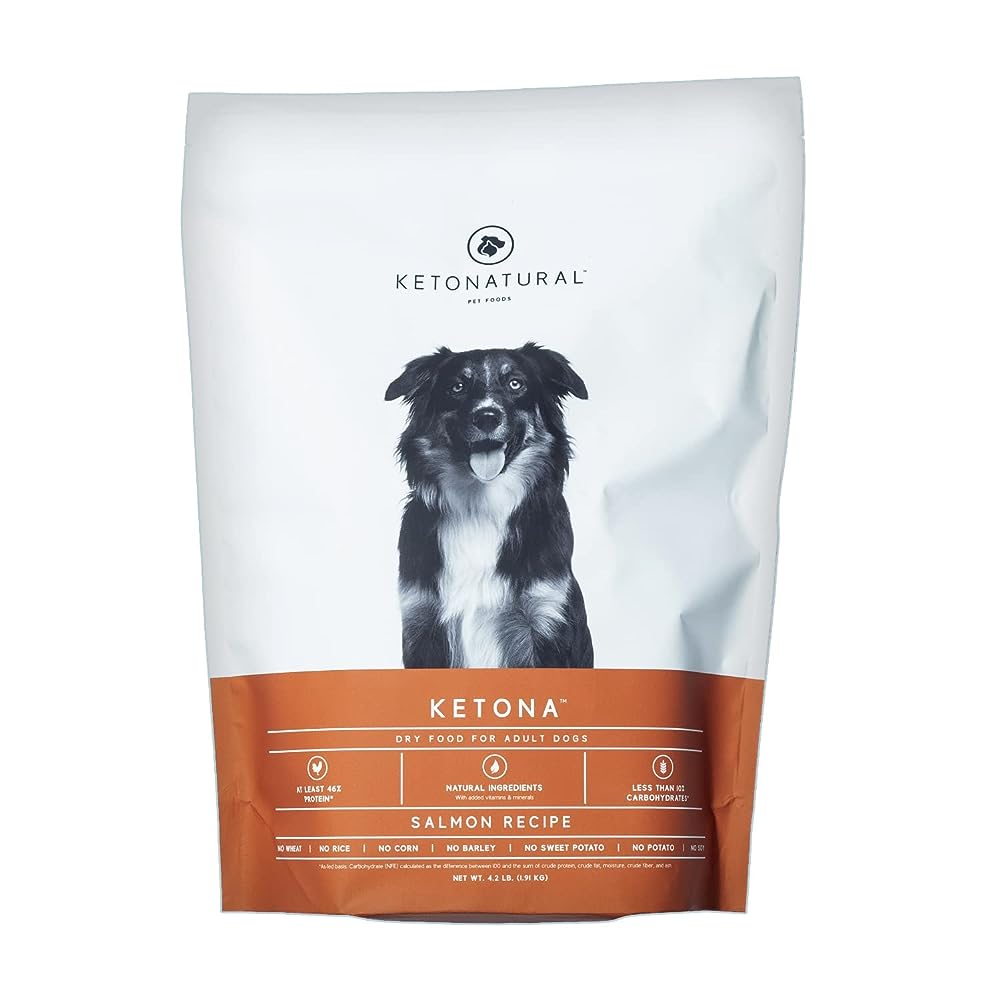
#6 – Ketona Chicken Recipe Adult Dry Dog Food, Natural, Low Carb (Only 5%), High Protein (46%), Grain-Free, The Nutrition of a Raw Diet with The Cost and Convenience of a Kibble; 24.2lb
Ketona Chicken Recipe Adult Dry Dog Food is a natural and low-carb option for dogs, containing only 5% carbohydrates and a high protein content of 46%. It is a grain-free and 100% made-in-the-USA product, with all chicken being non-GMO and antibiotic-free. Created by Daniel Schulof, the author of “Dogs, Dog Food, and Dogma,” this dog food aims to provide the nutrition of a raw diet with the convenience of traditional kibble.
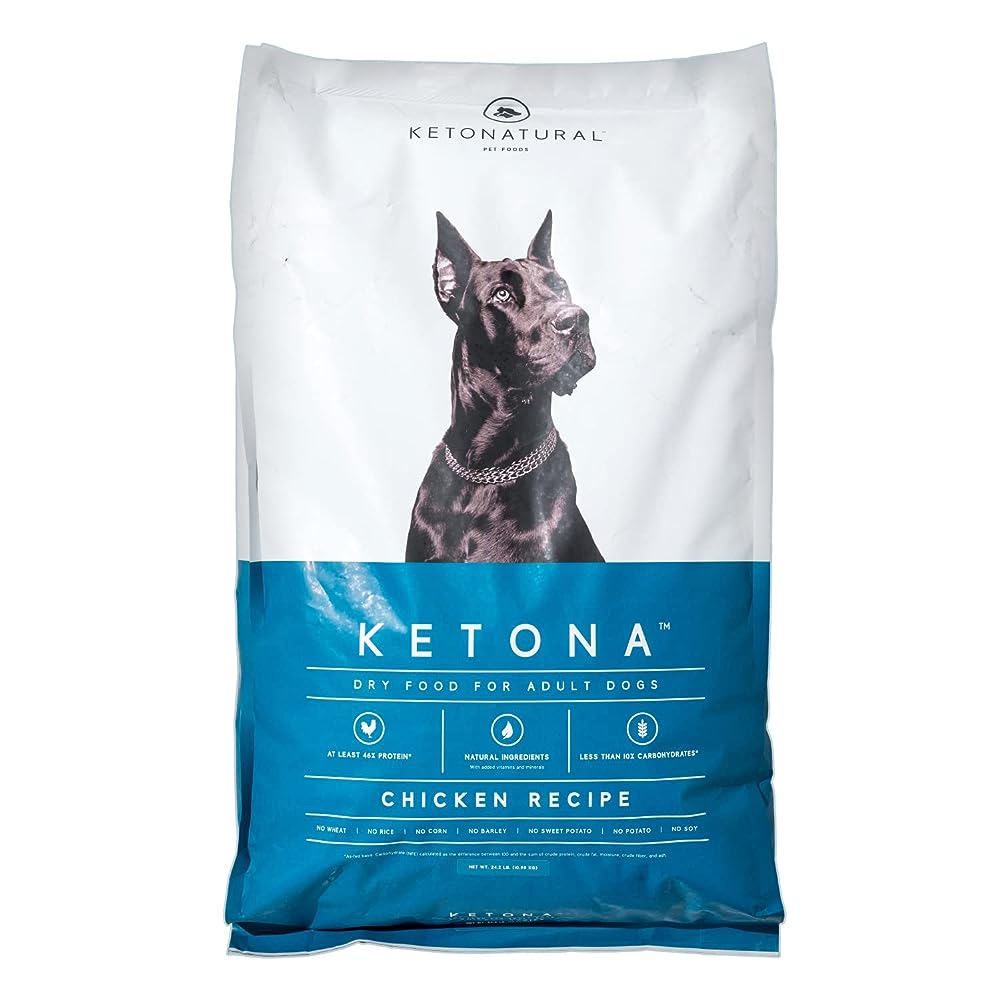

What Are The Benefits of a Ketogenic Diet for Dogs? What Are The Risks?
Ketogenic diets for dogs have both potential benefits and risks.
Benefits include:
- Weight Management: A ketogenic diet can help overweight dogs lose weight by forcing the body to burn fats rather than carbohydrates.
- Energy Levels: With fats being a more efficient energy source than carbs, dogs on a ketogenic diet may have more steady energy levels throughout the day.
- Reduced Inflammation: A ketogenic diet might reduce inflammation, which can be beneficial for dogs with arthritis or other inflammatory conditions.
- Cancer Prevention: Some studies suggest that a ketogenic diet may help prevent or slow the growth of certain types of cancer in dogs, although more research is needed to confirm these findings.
Risks include:
- Nutritional Deficiencies: It can be challenging to ensure a balanced diet when feeding your dog a ketogenic diet. This may lead to deficiencies in essential nutrients if not properly managed.
- Digestive Issues: A sudden change to a ketogenic diet can cause digestive problems like diarrhea or constipation. Gradual transition and appropriate fiber inclusion can help mitigate this risk.
- Pancreatitis: High-fat diets may increase the risk of pancreatitis, a serious inflammatory condition of the pancreas.
- Hard to Sustain: Maintaining a ketogenic diet can be difficult due to the strict requirement of low carbohydrates and high fat. It may also be less palatable for some dogs.
As always, it’s crucial to consult with your veterinarian before making significant changes to your dog’s diet. They can provide guidance based on your dog’s specific health status and nutritional needs.
Related: Top 13 Dog Food Brands With No Recalls
What Should I Look for When Choosing a Keto-Friendly Food for My Dog?
When choosing a keto-friendly dog food, there are several key factors to consider:
- Quality Protein Source: Protein should be the first ingredient and should come from a high-quality animal source, such as chicken, beef, or fish.
- High Fat, Low Carb: A ketogenic diet is high in fats and very low in carbs. Look for foods with a high percentage of healthy fats like omega-3s, and a low percentage of carbohydrates.
- No Grains or Sugars: Avoid foods that contain grains or sugars, as these are high in carbohydrates. That includes ingredients like corn, wheat, soy, and sugar in any form.
- All-Natural Ingredients: Ideally, the food should contain only natural ingredients with no artificial preservatives, colors, or flavors.
- Complete and Balanced: Despite being a specialized diet, keto dog food should still meet the AAFCO standards for complete and balanced nutrition. This ensures your dog gets all the necessary nutrients for their overall health.
- Nutrient Analysis: Always review the nutrient analysis to confirm the ratios of protein, fat, and carbs. A ketogenic diet typically has a high fat-to-protein ratio and less than 10% carbohydrates.
- Consult a Vet: Before transitioning your dog to a keto diet, consult with your vet. They can provide guidance based on your dog’s health condition and nutritional needs, and monitor the transition to ensure your dog is responding well to the diet.
Remember, every dog is unique, and what works best for one dog might not be ideal for another. Always monitor your dog’s health and adjust its diet as needed, in consultation with your vet.
Frequently Asked Questions About Keto Foods for Dogs
- What is a ketogenic diet for dogs? A ketogenic diet for dogs is a high-fat, adequate-protein, and very low-carbohydrate diet. It’s designed to help dogs burn fats rather than carbohydrates for energy. The diet was initially used for managing epilepsy in people, but some pet owners now use it for dogs with certain health conditions.
- What are the benefits of a ketogenic diet for dogs? A ketogenic diet can help manage weight, increase energy levels, and improve skin and coat health. It’s also been suggested to support brain health, potentially benefiting dogs with epilepsy, though more research is needed. As always, any diet should be discussed with your vet.
- Are there any risks to a ketogenic diet for dogs? Like any diet, a ketogenic diet can pose risks if not properly balanced. Potential risks include deficiencies in certain nutrients and the possibility of pancreatitis due to high-fat content. Always consult with a vet before starting your dog on a ketogenic diet.
- How do I transition my dog to a ketogenic diet? Transitioning should be done gradually over a week or more, replacing a portion of your dog’s current food with the new food each day. This helps avoid digestive upset. It’s crucial to monitor your dog during the transition for any changes in behavior, energy, or health.
- Can all dogs benefit from a ketogenic diet? While some dogs may benefit from a ketogenic diet, it’s not suitable for all dogs. Dogs with pancreatitis, liver disease, and certain metabolic disorders should not be on a ketogenic diet. Always consult your vet before changing your dog’s diet.
- What ingredients should I look for in keto dog food? Look for high-quality protein as the first ingredient, high in fat, low in carbs, and free from grains or sugars. Natural ingredients are preferred, and the food should be complete and balanced according to AAFCO standards.
- What’s the difference between grain-free and keto dog food? While both grain-free and keto diets limit grains, a ketogenic diet is specifically high in fat and low in carbs. Grain-free diets simply avoid grains but can still be high in carbohydrates from other sources like potatoes or peas.
- Can I cook homemade keto meals for my dog? You can, but it’s challenging to ensure a homemade diet is nutritionally balanced. If you decide to cook for your dog, consult a veterinary nutritionist to ensure you’re providing all the necessary nutrients in the right proportions.
- Is keto dog food more expensive? The price of dog food can vary widely. Keto dog foods often contain high-quality ingredients, which can make them more expensive than conventional dog foods. However, prices also vary by brand and where you shop.
- Is a ketogenic diet the same as a raw diet for dogs? Not necessarily. While a raw diet can be high in protein and fat like a ketogenic diet, it’s not always low in carbohydrates. Additionally, raw diets involve feeding raw meats, which carry their own risks and benefits separate from a ketogenic diet.
Conclusion: Best Keto Dog Foods
Making dietary choices for your dog can feel overwhelming with the abundance of options available. However, understanding the potential benefits and nutritional profile of a keto diet can guide you in choosing the best keto dog food for your pet. Whether your dog has specific health issues that might benefit from a ketogenic diet, or you simply want to provide a high-quality, nutritionally balanced food option, the products we’ve discussed can offer a great starting point. Remember, always consult your vet before making significant changes to your pet’s diet to ensure they will meet your dog’s unique nutritional needs.
iHeartDogs is reader supported. Some of the links below may be paid affiliate links, where we receive a small commission on a product at no additional cost to you.
- Best Overall Dog Foods
- Best Fresh Dog Foods
- Best Freeze Dried Dog Foods
- Best Subscription & Delivery Dog Foods
- Best Air Dried Foods for Dogs
- Best High Protein Dog Foods
- Best Non-GMO Dog Foods
- Best Alkaline Dog Foods
- Best Insect Based Dog Foods
- Best Goat Dog Foods
- Best Sports, Active & Performance Dog Foods
- Best Limited Ingredient Dog Foods
- Best Whitefish Dog Foods
- Best Trout Dog Foods
- Best Herring Dog Foods
- Best Dog Foods without Peas & Legumes
- Best Dog Foods for Joint Health
 Toledo, United States.
Toledo, United States.